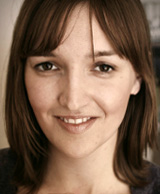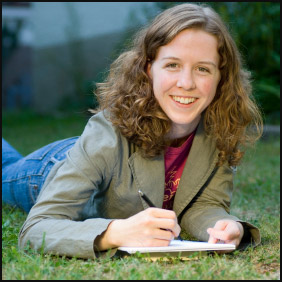What Makes Our Writing Workshop Different
Tineke Bryson, Workshop Coordinator
 A Wonder That Doesn’t Evaporate
A Wonder That Doesn’t Evaporate
To Daniel Schwabauer and his wife, Carrol, who started The One Year Adventure Novel in 2008, the Summer Workshop is better than Christmas. Ask them about it and their faces light up.
As the workshop coordinator, I can tell you: a lot goes into the event—we start planning about six months in advance—but when you spot them on arrival, their joy is transparent. And they continue to exude happiness all week long. Some years we don’t quite break even on the event, and yet they’ll declare: “Let’s do it again!” It’s not business to them. It’s a sacred mission to equip and encourage young writers.
Students feel the same wonder about the workshop. Many hoard pennies all year long to make sure they can come the following summer. On Facebook, I frequently see OYAN students post the number of days until the next one—they don’t even have to say what the countdown is about; everybody in their life knows.
And then there are the speakers. “This is such a great conference!” they tell me. “Other writers and agents ask us how they can get in to speak, too!” A number of them arrive with a suitcase disproportionately stuffed with costumes.
As coordinator, there are many things I’m proud of. I am proud that our speakers feel well cared for and want to come back. Our team works really hard, poring over the critique group lists and room assignments, to make sure students, especially first-timers, have a great experience.
But What Makes the Summer Workshop Special?
You may be thinking, “Okay, we get it. The Summer Workshop is a great time. But is it any different from other writing conferences?”
There are lots of writing events out there, and they have their own strengths, but I want to share why the One Year Adventure Novel (or “OYAN”) Summer Workshop stands apart. Sure I’m the workshop coordinator, but I’m also a writer and editor myself, and I’ve been to other writing conferences.
I do recommend writing workshops and conferences hosted by other organizations, but when it comes to teen or college-age writers, nothing touches this.
1. Your fellow attendees all have the same foundation as you.
Every person who registers uses The One Year Adventure Novel. We don’t require students to have completely finished the course to come, but everyone arrives with a “shared language” for talking about fiction. When you present your chapters to your critique group, they know exactly what you are trying to do and they use the same terms to communicate their ideas. You’ll know how fantastic this is the day you experience the opposite—as I have!

“Mr. S.” often makes his presentations in full costume!
2. Sessions begin where the OYAN course leaves off—they’re more in-depth.
Because students need a valid OYAN license to participate, we are free to cover more advanced topics in the sessions. In particular, Daniel Schwabauer’s sessions, far from being a live version of what you’ve already seen on video, are new material specifically for writers who already have OYAN under their belt.
3. Many first-timers arrive already knowing people: students they met on the Student Forum.
When I traveled to one big workshop as a college grad, I knew no one. I was not even familiar with any of the speakers. Turns out I was by far the youngest attendee, and while people were friendly, I had to start from scratch. I had no way to jump-start friendships ahead of the event.
You can avoid this by going with a friend or small group—as I did on another occasion—but the wonderful thing about the OYAN Summer Workshop is that you have so much opportunity to get to know people online beforehand, so you end up enjoying yourself so much more.
4. Every participant is a beginner.
At some writing workshops, you’re rubbing shoulders with attendees who may be far ahead of you in the writing journey. And because they are pretty expensive events, the majority are middle-aged adults, who have more disposable income. It can be hard, as a young writer, to avoid comparing yourself to others or feeling the need to impress.
But at the Summer Workshop, everyone is young and everyone is finding their footing in the writing world. Of course, some of our students have been writing longer than others, and there will always be a few with standout talent, but everyone is there because they are trying to grow as a writer. No one’s “made it big”—they’re in their teens or early twenties, just like you.
5. Mentor Appointments are actually practice.
Once you have written several novels and pursued developmental editing—in short, when you have grown so much as a writer that you’re ready to submit to publishers and talk to agents—big regional or even national writing conferences are a good investment. You pay for one-on-one appointments with agents, where you pitch your ideas. In today’s publishing world, getting an agent is vital. Few publishing houses even accept unsolicited manuscripts or query letters.
Sound absolutely terrifying? It’s normal to be nervous, of course, but one reason you may think this sounds horrible is that you aren’t actually ready for a “real” agent appointment. I mean, have you had any practice ones yet? If you haven’t, the Summer Workshop is terrific. Our mentor appointments are supposed to be “for practice.” That’s the whole idea, and the mentors know that.
Still scared? That’s okay. But a non-intimidating chat with one of our speakers—it only lasts 15 minutes!—is a good place to get rid of some nerves. If you stumble on your practice pitch and need to start over, your mentor will laugh it off with you.
6. It’s affordable! (Really!)
Some people lament that the Summer Workshop is too expensive. While your circumstances may make it difficult or even impossible to come (you might live several plane tickets away, or have to self-fund without even a part-time job), the Summer Workshop is very affordable compared to other writing conferences. If you don’t believe me, have a look at some other workshops.
My goal is not to point a finger at other organizations. They have different factors to work with. But I do want to communicate that for a young writer looking to start on their writing journey, the Summer Workshop is a very good deal. You can begin with the Summer Workshop and work your way to funding a bigger, more expensive experience when you’re further along in your writing and stand to benefit more from what those types of events offer.
7. The “Magical” Factor: Love
I would not dream of claiming that the OYAN community is the best writing community ever. I have been to other events and witnessed the camaraderie and the support participants have for one another. Recently one of our students, Adrienne, wrote about her surprise that the Summer Workshop did not “ruin her” for other conferences. She made a compelling case for why OYAN students should look beyond the Summer Workshop walls for friendship and training.
But I will say that I haven’t seen quite this level of friendliness and ease in other settings. OYAN students are very welcoming to first-comers; and they don’t perceive the talents of others as a threat. They encourage each other. And it is beautiful to see the freedom students feel to be themselves—and in our crowd that means very, very imaginative!
Many students come year after year, to the Summer Workshop, the Winter Workshop (advanced; ages 18+), or both. The layers of connection make the events resemble a reunion or retreat.
If there comes a day when I can no longer coordinate these events, or attend, I will look back on them as some of the most valuable experiences of my life. That’s as an adult who is not even experiencing them from the attendee perspective! Having helped run big conferences in other settings, I can assure you that wanting to come back to an event at which you have worked is unusual!
I hope that if you’re reading this and have never been to the Summer Workshop you will seriously consider it. And if you don’t have OYAN, get it! (It’s great for adult writers, too.)
…
If you have been to one of our Summer Workshops, what reasons would you add to this list?
…
Tineke Bryson (Honors in Writing, Houghton College) lives in the very center of a pretty complicated Venn diagram, right where fiction and nonfiction, creating and editing, and North American, European, and West African culture meet. Tineke grew up abroad, and before joining The One Year Adventure Novel, she worked as an editor.
She and her husband, Matthias, live in Lawrence, Kansas. She loves British history, reading YA fantasy, and collecting moths.




